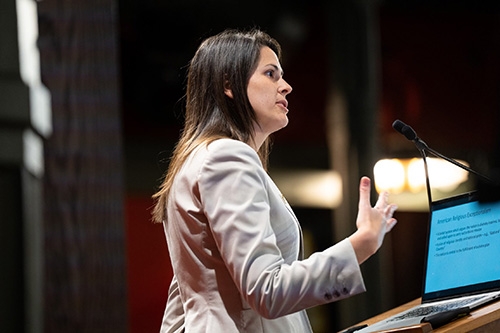When Allyson Shortle ’05 and her colleagues began to write about the convergence of the alt-right and Christian nationalism about a decade ago, their work was widely dismissed as extremist.
Today, it’s fair to say they were right.
“We had been working on this topic for so long, and people did not think this was an ideology that existed or would have an impact on American politics,” said Shortle, an associate professor of political science at the University of Oklahoma.
Beginning in 2011, when she and her colleagues began writing articles, only a handful of sociologists “had our backs and said ‘this is very real,’” she added.
Shortle is co-author (with Eric L. McDaniel and Irfan Nooruddin) of a book, The Everyday Crusade, which describes American Christian Nationalism, a widely-held religious nationalist ideology steeped in myth about the nation’s original purpose. The authors write that this ideology is attached to anti-immigrant hysteria, isolationism, and an increasing willingness to support alternatives to democratic governance.
Shortle was on campus this winter for a talk in the Nott Memorial. She also visited classes during the day.
She said that the insertion of religion in government is unprecedented. “We’ve had a long history of people implicitly being religious in politics, but now … people are not hiding their intentions to insert Christianity into the federal government, which is essentially theocratic,” she said. “Our democratic norms always promoted the separation of church and state. We see that a lot of Americans are tolerating this erasure of the wall between church and state.”
The forces that led to the attempted insurrection on January 6 have existed for centuries, she said. In 2021, however, they had elite support. “These things can happen if you have the right actors in charge and organization by the various groups,” she said.
Before the 1970s, Shortle said, white evangelicals thought that getting involved with politics would sully their commitment to God. But political participation by evangelicals rose as conservative coalitions took advantage of the religious right’s ability to organize. “[Religious] ideologies have always existed,” Shortle said, “just not by people who participated in politics.”
Shortle, who earned her Ph.D. from Ohio State University, used survey data spanning three presidential administrations to develop an understanding of American national identity and the exclusionary ideologies that have emerged.
Shortle earned her B.A. in political science from Union, where she was a summa cum laude graduate, member of Phi Beta Kappa and a Union Scholar. She hosted an eclectic show on WRUC with her friend and roommate, Georgina (Serroukas) Smith ’05. Shortle played Motown and classic rock. Georgina gravitated toward punk. Shortle also worked as a server at the Van Dyck restaurant and jazz club, often with her roommate.
Her interest in immigration politics began as a work-study in Becker Career Center, where she helped international students with visa problems.
Her love of research was nurtured at Union by Prof. Terry Weiner, who told her to “be scrappy” and “hit the pavement” for her senior thesis on education administrators’ opinions about the federal “No Child Left Behind” program. “The most memorable part of my senior thesis was seeing that people were really passionate about things,” she recalled.
During her campus visit, Shortle joined Prof. Zoe Oxley’s class on political psychology for a discussion about her book and life as a grad student. “They were engaged and excited,” she said. “I felt like I was teaching my Ph.D. students.”
